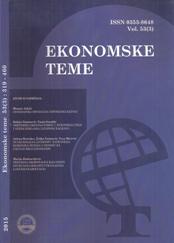Economic Themes (2015) 53 (3) 5, 375-396
Jelena Radojičić, Predrag Radovanović
Abstract: The global financial crisis has revived interest in the introduction of the “narrow banking”, which has become a topical issue in both political and academic circles. There are attitudes that banks have maximized yields by excessive credit expansion, while the losses associated with the excessive risks undertaken in pre-crisis period fell at the expense of taxpayers. Based on the idea that modern financial systems have structural problems whose solution requires fundamental reform, a new wave of regulatory proposals is launched for solving the problems. They are generally aimed to eliminate the banks’ ability to issue credit money that enjoys both implicit and explicit government guarantees. The concept of narrow banking, as one of the variants of full-reserve banking, provides ex-ante a level of bank deposits’ protection which is the same as the level of central bank’s money protection. Motives for the application of this concept are the following: to make banks more resistant to bank runs; to avoid creating a speculative “bubbles”; and to make the financial system more stable. The paper gives an overview of historical and new proposals of narrow banking. In addition, the concept of narrow banking is analyzed from the point of view of its basic characteristics and objectives, followed by a discussion on the problems and possible success of its implementation.
Keywords: credit money; moral hazard; financial crisis; narrow banking; financial stability
NARROW BANKING – BANKING SYSTEM WITHOUT PRIVATE ISSUANCE OF CREDIT MONEY AS A SOLUTION FOR MORE RESISTANT BANKS AND MORE STABLE FINANCIAL SYSTEM
Jelena Radojičić, Predrag Radovanović
Abstract: The global financial crisis has revived interest in the introduction of the “narrow banking”, which has become a topical issue in both political and academic circles. There are attitudes that banks have maximized yields by excessive credit expansion, while the losses associated with the excessive risks undertaken in pre-crisis period fell at the expense of taxpayers. Based on the idea that modern financial systems have structural problems whose solution requires fundamental reform, a new wave of regulatory proposals is launched for solving the problems. They are generally aimed to eliminate the banks’ ability to issue credit money that enjoys both implicit and explicit government guarantees. The concept of narrow banking, as one of the variants of full-reserve banking, provides ex-ante a level of bank deposits’ protection which is the same as the level of central bank’s money protection. Motives for the application of this concept are the following: to make banks more resistant to bank runs; to avoid creating a speculative “bubbles”; and to make the financial system more stable. The paper gives an overview of historical and new proposals of narrow banking. In addition, the concept of narrow banking is analyzed from the point of view of its basic characteristics and objectives, followed by a discussion on the problems and possible success of its implementation.
Keywords: credit money; moral hazard; financial crisis; narrow banking; financial stability

